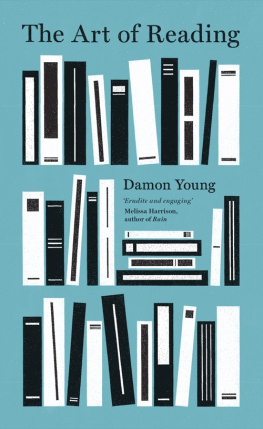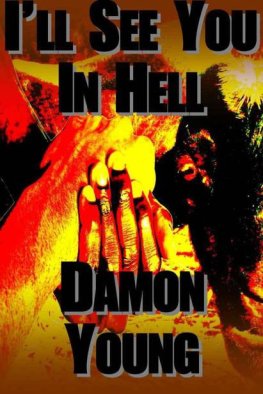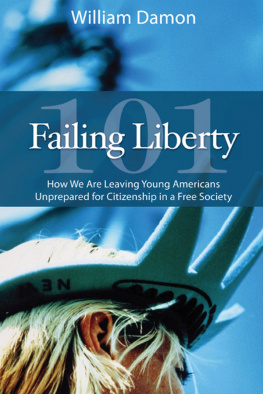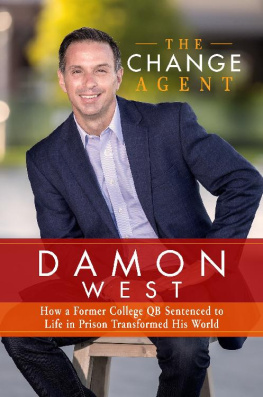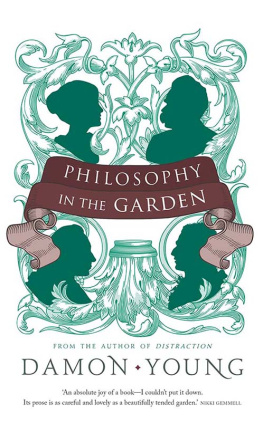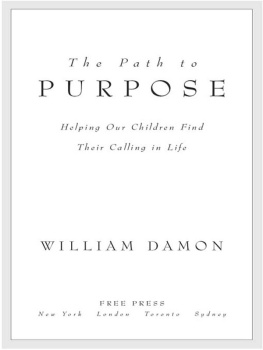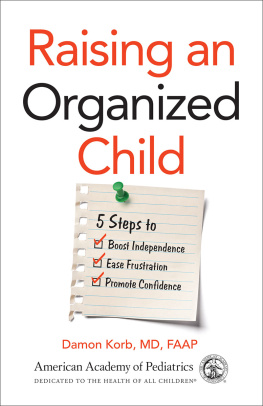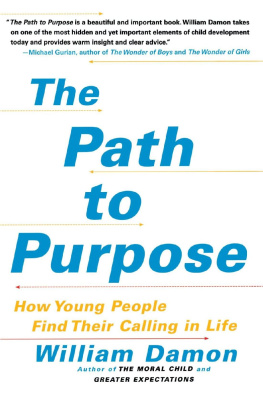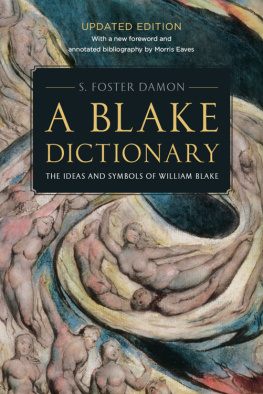
ON GETTING OFF
Damon Young is a prize-winning philosopher and writer. He is the author or editor of thirteen books, including The Art of Reading , How to Think About Exercise , Philosophy in the Garden , and Distraction . His works have been translated into eleven languages, and he has also written poetry, short fiction, and childrens fiction. Young is an Associate in Philosophy at the University of Melbourne.
Scribe Publications
1820 Edward St, Brunswick, Victoria 3056, Australia
2 John St, Clerkenwell, London, WC1N 2ES, United Kingdom
3754 Pleasant Ave, Suite 100, Minneapolis, Minnesota 55409, USA
First published by Scribe 2020
Copyright Damon Young 2020
All rights reserved. Without limiting the rights under copyright reserved above, no part of this publication may be reproduced, stored in or introduced into a retrieval system, or transmitted, in any form or by any means (electronic, mechanical, photocopying, recording or otherwise) without the prior written permission of the publishers of this book.
Every effort has been made to acknowledge and contact the copyright holders for permission to reproduce material contained in this book. Any copyright holders who have been inadvertently omitted from the acknowledgements and credits should contact the publisher so that omissions may be rectified in subsequent editions.
9781925849219 (Australian edition)
9781912854233 (UK edition)
9781950354559 (US edition)
9781925938555 (ebook)
Catalogue records for this book are available from the National Library of Australia and the British Library.
scribepublications.com.au
scribepublications.co.uk
scribepublications.com
Alice Tarbuck, excerpt from Mary Godwin Shelleys Second Wife from We Were Always Here: A Queer Words Anthology , edited by Ryan Vance. Copyright 2019 by Alice Tarbuck. Reprinted with the permission of 404 Ink, www.404ink.com.
Ellen Bass, excerpt from The Morning After from Like a Beggar . Copyright 2014 by Ellen Bass. Reprinted with the permission of The Permissions Company LLC on behalf of Copper Canyon Press, www.coppercanyonpress.org.
Jessica McKenna, excerpt from Ease of Use from Cliterature . Copyright 2017 by Jessica McKenna. Reprinted with the permission of Cliterature . https://cliteraturejournal.com.
Shastra Deo, excerpt from Chine from The Agonist . Copyright 2017 by Shastra Deo. Reprinted with the permission of the University of Queensland Press, www.uqp.uq.edu.au.
explanation by sex tends for us to have a kind of intuitive obviousness, as if we perfectly knew what sex was.
IRIS MURDOCH
Metaphysics as a Guide to Morals
How many things are possible, in the immense universe of Heaven and Earth!
PU SONGLING
The Fornicating Dog
CONTENTS
The Classroom
On the Sudden Strangeness of Sex
I will begin where this began for me: As legs.
It was the late eighties, in a portable classroom. Black aluminium window frames, laminated tables with rounded edges, a wonky dark green blackboard. Summer stuffiness. Perhaps the teacher thick-rimmed glasses, high belted trousers, chronic sneer was speaking. Perhaps not. The lesson did not matter.
I was looking at a classmate.
A had her knees up on the desk, and was rocking back and forth. It was enthralling. Or, more correctly: I was enthralled.
I had seen legs before alongside bellies and backs and chests. In first grade, one fellow pupil even pulled her underwear down. I did the same. But this was hilarious, not arousing. As a young child, bodies were occasionally a joke, mostly unseen and unexciting.
As legs, they were suddenly very visible to me and not funny at all. They felt like an invitation. They were not, of course. A was oblivious to my existence. And I later realised my own obliviousness, casually turning another human being into a prop for my pleasure. But honesty is important here: it felt like her skin was there for me; was an offering.
An offering of what? There were not yet even vague fantasies. For all my illusions of invitation, there was no address on the envelope; no party to attend. I had longing, but not for anything. This was pure yearning. It is awkward to use the word desire about a child: it seems anachronistic and crude. But the word does justice to my memories. I was eleven years old, and feeling the beginnings of arousal; the buds of lust.
Plaited and Puzzling
It was a strange sensation. It felt familiar, this need. It was part of a well-known world: the same uniforms and accents, chalkdust and pencil sharpenings. I was myself, surely. Yet this was totally new: novel enough for me to remember it, decades later. Nothing in my childhood made sense of this. I had urges for lasagne or toy robots, but I wanted to eat or play with these; they had some obvious use. A wasnt for anything. She was just there: someone I had to look at, because the mere existence of her calves and thighs gave me a gut ache. A pleasant gut ache.
This had to look was also weird: I felt pushed into gazing. The urge felt profoundly intimate, like no one else would or could feel this way. And these are straightforwardly my memories or my memories of memories, at least. They have a first-person mineness to them; an atmosphere of selfhood. Yet the nudge was not wholly mine. It felt automatic: a necessity of feeling, if not of behaviour. In short, it was not quite my arousal. It was like the hand of a stranger on the back of my skull. Look, it shoved. Look .
This, in turn, meant that I was no longer wholly Damon. For the first time, I felt at odds with myself. No other basic needs had done this, perhaps because they arose in infancy, and were soon part of my growing psyche. As a school-aged child, I never felt undone by or uncomfortable about hunger, thirst, or the dash for the toilet. But this? It was like I had been invaded, and this alien had made itself at home in me as me.
What had changed? A was the same, with the same goody-two-shoes demeanour. I was the one transformed: this odd longing, rising up within me. Yet it felt like the world had shifted too; like its meniscus had a new sheen. As legs suddenly had charm. This charisma spread across her whole persona, making her someone I wanted to know. (This never happened. The want was enough.) This had a curious physicality to it. I did not merely feel A was sexy she was sexy. There was no naysaying this new reality. Put another way, my lust was now part of the universe. It was as much a fact as the smell of the canteens sausage rolls or teachers cigarettes.
Alongside this fact was lack. Gaping in the classroom, I felt I was missing something. I was simply not enough on my own. I needed A. Or, a little later, her friend B. Or my neighbour, C. Or him, or her, or they, or, or This need sacrificed the present on the altar of the future, offering more in fantasy than reality provided. It was distracting. This was the beginning of a lifetimes deficit. Not because I needed some romantic union, some eternal gathering of selves. The dearth was erotic, and no one person could meet it. Looking back, I doubt it can be met. For me, desire is restless and seemingly endless, and what changes is its force not its logic. It is often foolish.
As a child, I had been warned about adolescence: the chuckled warnings, the medical explanations. The portrait was chiefly physiological, full of hair, bumps and tumescence. This was all true and sometimes awkward. But no one nodded to the existential trauma of sexuality; the way the cosmos and I seemed to split apart. It was familiar but shocking; mine but foreign; within me but out there; promising some ultimate satisfaction, but offering little but want.
Next page

